First Party Insurance
Exercise from Last Class
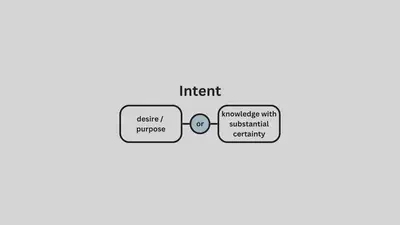
Abridged Definition from Restatement (Third) of Torts
A person acts with the intent to produce a consequence if:
(a) the person acts with the purpose of producing that consequence; or
(b) the person acts knowing that the consequence is substantially certain to result.
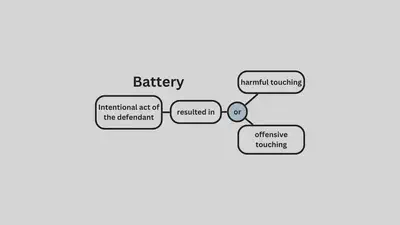
Abridged Definition from Restatement (Second) of Torts
An actor is subject to liability to another for battery if he acts intending to cause a harmful or offensive contact with the person of the other or a third person, or an imminent apprehension of such a contact, and a harmful or offensive contact with the person of the other directly or indirectly results.
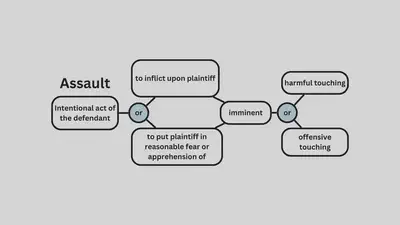
Abridged Definition from Restatement (Second) of Torts
An actor is subject to liability to another for assault if (a) he acts intending to cause a harmful or offensive contact with the person of the other or a third person, or an imminent apprehension of such a contact, and (b) the other is thereby put in such imminent apprehension.
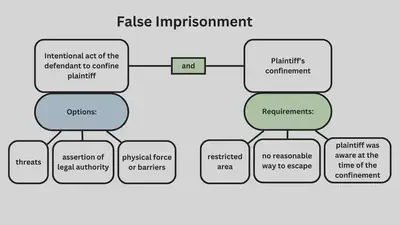
Abridged Definition from Restatement (Second) of Torts
An actor is subject to liability to another for false imprisonment if
(a) he acts intending to confine the other or a third person within boundaries fixed by the actor, and
(b) his act directly or indirectly results in such a confinement of the other, and
(c) the other is conscious of the confinement or is harmed by it.
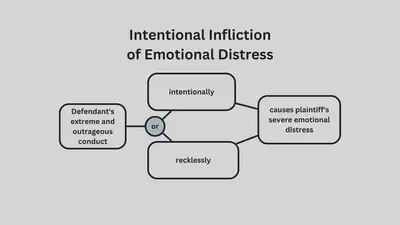
Abridged Definition from Restatement (Second) of Torts
One who by extreme and outrageous conduct intentionally or recklessly causes severe emotional distress to another is subject to liability for such emotional distress, and if bodily harm to the other results from it, for such bodily harm.
Defenses
— Consent
— Self-defense
— Defense of property
— Necessity
You are a personal injury attorney in the state of Loyola. In Loyola, a protest and counter-protest over gun regulations began to get out of hand. Annie stood at the front lines of the protest arguing for assault weapon regulation, and Bob stood at the front lines of the counter-protest arguing for free assault weapons for public school teachers. The two protests began on opposite sides of city park but grew closer together over the course of the day and were now squaring off face-to-face. Annie started addressing Bob directly. “You think it’s worth it for kids to die so you can pretend you’re a real man? What are you compensating for, buddy? Huh? Wife left you? Maybe instead of buying so many guns, you should buy a gym membership, you fat piece of shit!” As she screamed at him, flecks of spit kept landing on Bob’s face. She pointed her index finger right between his eyes, inches from his face as she said, “No one is ever going to love you.”
Bob drew his SIG Sauer P365 pistol from its holster on his hip and pointed it at the ground by his feet. “Back up. Stop spitting on my face. And stop being so mean to me.” “Are you going to shoot me?” Annie asked. “If I have to.” Bob responded. “I’m calling the cops,” Annie said, and retreated back into the crowd.
Annie did not call the cops. But she did sue Bob for assault. Bob has now hired you as his attorney. Having never been sued before, Bob wants you to advise him on his legal options. Please consider any defenses Bob might raise, any intentional tort claims he might have against Annie, and any defenses she might be able to raise. As you advise Bob, be sure to inform him of how strong or weak these claims or defenses are and why. For the purposes of this question, do not consider any negligence or strict liability claims.
Defenses for Bob
- Consent
- Self-defense
- No prima facie case of assault
Claims that Bob might have against Annie
- Assault and Battery (Spitting)
- Assault (Finger in the face)
- IIED
My Notes on Assault and Battery (Spitting)
Battery
Rule: Battery if D takes intentional action that results in offensive or harmful contact to plaintiff.
Issues
Intentional act?
Intent rule: desire/purpose or knowledge w/ substantial certainty
— Based on facts, hard to argue that she had desire/purpose to spit
— BUT “flecks of spit kept landing on his face” which means that this was ongoing. Maybe first time was a mistake, but if she’s being beligerrent and just spitting all over his face, then she has knowledge that if she keeps doing it, she’ll keep spitting on him.
Causation?
— No issue there.
Harmful touching?
— No physical harm reported.
Offensive touching?
— Rule: Contact must be offensive to a reasonable sense of personal dignity.
— Spit can count. But does it always? Must be related to personal dignity. Spitting is often a humiliation / demeaning thing. Goal of intentional tort is to prevent revenge / blood feuds / violence over honor. Seems like a different kind of spitting. But mixed with her demeaning words…
Defenses?
Consent?
— Not explicit.
— Maybe implicit? At a protest. People are going to be chanting and yelling. You’re assuming the risk of getting some spittle on you, right? Seems to come back to this issue of whether this is a humiliating spit on someone or incidental spit. Maybe could go to the jury? Seems like a longshot.
Self defense? No.
Defense of property? No.
Necessity? No.
Assault
Rule: Assault if D takes intentional action that results in P’s reasonable apprehension of imminent harmful or offensive contact.
Very similar issues!
Intentional act? Repeat of battery analysis
P’s reasonable apprehension?
— Apprehension - yes, because he told her to stop spitting on him
— Apprehension reasonable? - yes, reasonable person would apprehend someone spitting on them
Imminent harmful or offensive contact?
— Imminence? Non-issue here
— Harmful or offensive contact? Repeat of battery analysis.
Defenses? Same as battery.
First Draft of part of an Answer to Bob
You can sue Annie for the intentional torts of assault and battery, but I can’t predict a win with any strong degree of certainty because the court may dismiss those claims either because we cannot meet our burden of proving a prima facie case of assult and battery or because Annie has an affirmative defense of consent. As both of these claims succeed or fail for the same reasons, I will address them together. A defendant commits battery when they take intentional action that results in offensive or harmful contact to the plaintiff. A defendant commits assault when they take intentional action that results in the plaintiff’s reasonable apprehension of imminent harmful or offensive contact. We may have difficult proving that Annie’s spitting was intentional and that the spit constituted an offensive touching. Annie may prove that you consented to the touching by being at a public protest.
It’s not crystal clear that Annie had the legal intent to spit on you. For the intentional act requirement of both assault and battery, the defendant must have acted with the desire to cause this bodily contact or acted with knowledge of the substantial certainty that this contact would happen. Based on the facts, her spitting seems incidental to her yelling at you, unlike a more clearcut case in which she would have hocked a loogie at you. We may have a chance to win this because flecks of spit kept landing on your face. Maybe she didn’t have knowledge with substantial certainty that she would spit on you when she began yelling, but after the spit droplets began to fall, she gained the knowledge that if she kept yelling, she’d continue to spit on you.
As you weren’t physically harmed by the spitting, our assault and battery claims will have to rest on the argument that her spitting on you constituted offensive touching. A touch is offensive if it would offend a reasonable person’s sense of personal dignity. The good news is that courts have found spitting to constitute offensive touch before. But those circumstances were also when the spitting was an explicit action design to attack, humiliate, and demean someone. There’s a question of whether this more incidental spitting also counts as being offensive since it was not as direct of an attack on your dignity. But the spitting was coupled with her saying some very demeaning things, so that should work in our favor. I’ll have to dig into the caselaw here and get back to you.
Annie may also raise an affirmative defense of consent. The defense of consent can be summed up as: to one who is willing, no harm is done. Although you never explicitly agreed to be spat upon, you did attend a protest where people would be chanting and cheering. Annie can argue that you implicitly agreed to risk getting sprayed by some incidental spittle by attending the protest. Her success with this defense is going to depend on the particular facts of this spitting. Was it the kind of incidental contact in a crowded world that the courts don’t want to be in the business of mediating? Or did it exceed the kind of contact that one should expect at a protest? I think she’s likely to prevail on this defense, but the court may allow the jury to decide the issue since it is so fact dependent.
The other elements of the claims are non-issues. There’s no question that her actions caused the spit to land on you or that the contact of the spit with your body was imminent. And the defenses of self defense, defense of property, and necessity are not applicable.
The Big Picture
Torts
— Remedies
— Negligence
—— Breach
—— Duty
—— Causation
—— Defenses
— Strict Liability
—— Traditional view
—— Products liability
— Intentional Torts
Not Torts
—— Insurance
—— Workers’ Compensation
—— Alternatives to Tort
1) Positive and Negative Space
Napoleon Leading the Army over the Alps Kehinde Wiley

2) Tort concepts are infectious.
3) I want you to look smart.
But it’s not torts.
First party insurance
Collateral source rule
Subrogation
Three possibilities
- Imagine that there is no subrogation. A defendant injures a plaintiff. The plaintiff’s health insurance provider covers most of the plaintiff’s medical bills. The plaintiff wins a lawsuit against the defendant and pockets the damages awarded for the part of the medical bills that insurance covered.
Three possibilities
- Imagine that there is no collateral source rule. The defendant only has to compensate the plaintiff for the plaintiff’s actual out of pocket medical expenses — not what health insurance covered.
Three possibilities
- Subrogation and collateral source combined. The defendant has to fully compensate the plaintiff, but the insurance provider and the plaintiff each take their share of the damages.
Frost v. Porter Leasing Corp.
